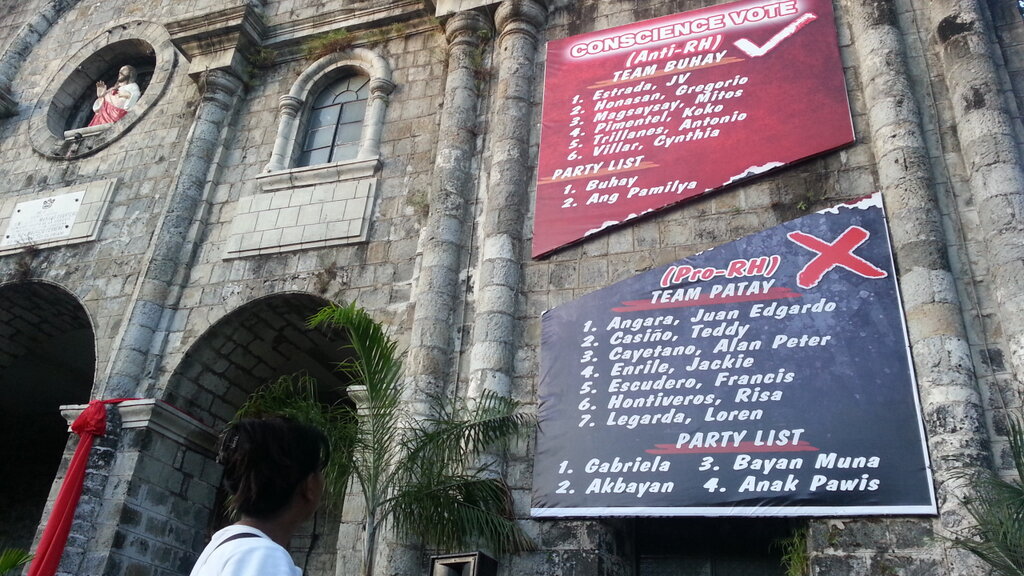SUMMARY
This is AI generated summarization, which may have errors. For context, always refer to the full article.

MANILA, Philippines – Could the Team Patay, Team Buhay tarpaulins be considered election propaganda or not?
The Supreme Court weighed in on this question during oral arguments on Tuesday, March 19, as they debated the legality of a Commission on Elections’ order to bring down tarpaulins that contain the names of senatorial candidates who are for and against the Reproductive Health law.
The Comelec order was issued to a Bacolod diocese which put up the tarps that list down the names under Team Patay (candidates who voted for the RH law) and Team Buhay (candidates who voted against the law). The Catholic Church is staunchly opposed to the law.
In the tarpaulins, “Team Buhay” includes senatorial candidates JV Estrada, Gringo Honasan, Mitos Magsaysay, Koko Pimentel, Antonio Trillanes, and Cynthia Villar. Also endorsed by the diocese based on the tarps are party-list groups Buhay and Ang Pamilya.
“Team Patay” candidates include Juan Edgardo Angara, Teddy Casiño, Alan Cayetano, Jack Enrile, Francis Escudero, Risa Hontiveros, and Loren Legarda and party-list groups Gabriela, Akbayan, Bayan Muna, and Anakpawis.
The Comelec said the tarps, measured 6 feet by 10 feet, are oversized since they exceed the Comelec-prescribed size of 2 feet by 3 feet. But the Bacolod diocese refused to take them down, deciding instead to bring the issue to the High Tribunal and cut the tarps into half. (Read: Team Patay, Team Buhay: Unconscionable)
Render unto Caesar’s…
Dean Ralph Sarmiento of La Salle Bacolod, counsel for Bacolod Bishop Vicente Navarra, said “it is no longer relevant if the tarpaulin is a political advertisement because it is protected by bill of rights.”
Sarmiento invoked the religious freedom of the bishop to express his belief on the RH law, which the Catholic Bishops’ Conference of the Philippines has assailed for its provisions on the use of artificial contraception.
The Comelec’s order violates the separation between the Church and state, Sarmiento said.
Sarmiento said the constitutional right of freedom of expression also allows Navarra to air his political views.
Chief Justice Maria Lourdes Sereno pointed out, however, that the Comelec is not questioning the content of the tarpaulins. The poll body only wanted to remove them because they did did not fit the poll body’s requirements, she noted.
She said the rule applies to all, even to a Bacolod diocese.
“I also read the Bible,” said Sereno, a born-again Christian. “In the Bible, it is said that you have to render unto Caesar’s what is Caesar’s.”
“If there is government regulation on taxes, even if God owns the whole world, you have to pay taxes,” she said.
She added that religious freedom is not an absolute right.
Sereno said that all materials “that tend to influence electorate” should be regulated by Comelec.
What election material?
But Sarmiento disagreed, adding that the tarpaulins are not a form of election propaganda.
They were put up to help raise awareness on the stand of candidates on the RH law and to appeal to a “conscience vote,” according to him.
Justice Estela Perlas-Bernabe asked Sarmiento, however, if the tarpaulins would affect him as a voter. “What effect does this tarpaulin have on you as a voter? Will it influence your vote at all?”
Sarmiento said “it may,” but added that he will still base his vote on his own judgment.
Solicitor General Francis Jardeleza, counsel for government and the Comelec, said that the tarpaulins tend to call for support for candidates who opposed the RH law.
Not to private people
Sarmiento also said the Comelec restriction does not apply to the Bacolod diocese because they are not part of any political party nor are they candidates.
Justice Roberto Abad said the rationale of the Fair Elections Act or Republic Act 9006 is to level the playing field for candidates. The restriction on the size of campaign materials allows candidates – whether they have campaign funds or not – to promote their candidacy.
A campaign poster that is bigger than 2 feet by 3 feet would be more expensive, hence the need to impose size limits, he said.
But he claimed this cannot apply to private individuals because they are not involved in a political campaign. He said a person should not go to jail just because he spent his money on a poster expressing his views on the elections.
Justice Teresita Leonardo de Castro held the same view. She said the government must be able to show how an act of a private person could circumvent the limits on election spending.
But Justice Antonio Carpio noted that on the contrary, the law does not say that the penalty for violating restrictions on campaign propaganda excludes private individuals.
Jardeleza said that the petitioner erred in going to the Supreme Court first. He said the Bacolod diocese should have first exhuasted the administrative remedies in Comelec.
Sarmiento said the Bacolod diocese was not given any notice by the poll body, however, and was immediately given the order to remove the tarpaulins. – Rappler.com
Add a comment
How does this make you feel?
There are no comments yet. Add your comment to start the conversation.